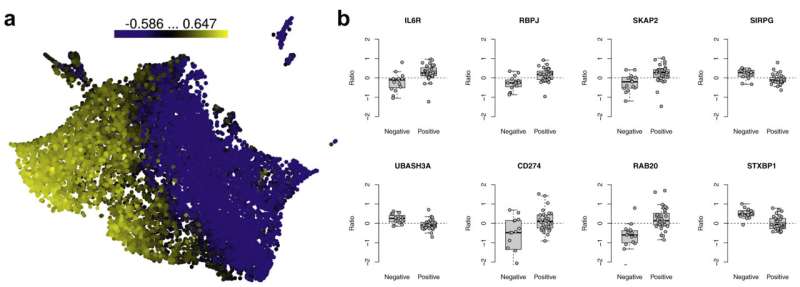This article has been reviewed according to Science X's editorial process and policies. Editors have highlighted the following attributes while ensuring the content's credibility:
fact-checked
peer-reviewed publication
trusted source
proofread
Researchers identify gene expression signature that predicts progression of type 1 diabetes

Researchers from Turku Bioscience Center and InFLAMES Flagship at the University of Turku in Finland, have identified a gene expression signature that can predict the progression of type 1 diabetes.
The study led by Professor Laura Elo and Professor Riitta Lahesmaa aimed to identify transcriptional changes associated with disease progression in patients with recent-onset type 1 diabetes. The work is published in the journal eBioMedicine.
The researchers analyzed blood samples collected as part of the global INNODIA partnership. A certain gene expression signature was found to be associated with rapid disease progression.
"One benefit of such predictive signature would be the ability to intervene earlier in the disease process. This could help slow the progression of the disease and potentially prevent or delay the onset of symptoms. Another benefit would be improved monitoring of the disease progression, which would allow for more personalized treatment plans and better outcomes for patients," Elo and Lahesmaa explain.
Type 1 diabetes is a complex autoimmune disease where insulin-producing beta cells in the pancreas are destroyed. Disease progression varies between individuals and currently there is no way to predict individual outcomes.
Patients are involved in INNODIA
INNODIA is a global partnership between 31 academic institutions, six industrial partners, a small sized enterprise, and two patient organizations. Their common goal is to fight type 1 diabetes.
INNODIA examines samples and data from newly diagnosed patients with type 1 diabetes and unaffected first degree relatives throughout Europe. The project runs under the framework of the European Union´s Innovative Medicines Initiative—Joint Undertaking (IMI-JU) with a dedicated governance.
"Importantly, INNODIA is closely guided by the patients themselves, through the Patient Advisory Committee, consisting of a group of type 1 diabetes patients and parents. They give continuous feedback on the concept of INNODIA and development of protocols, and are crucial in disseminating the goals of the project to the public," Riitta Lahesmaa says.
Lahesmaa mentions that thanks to the INNODIA research, the science community will be able to better understand the relationship between changes in β-cell function, immune profiles, genetic and environmental factors and their role in the onset of the disease.
More information: Tomi Suomi et al, Gene expression signature predicts rate of type 1 diabetes progression, eBioMedicine (2023). DOI: 10.1016/j.ebiom.2023.104625















